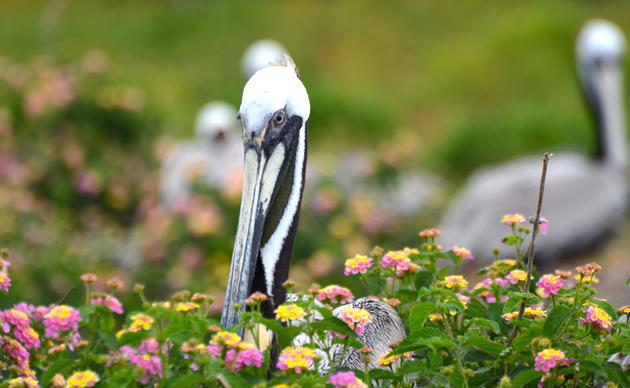Colonial Waterbirds
Colonial Waterbirds are birds that gather in large groups called rookeries or colonies during nesting season. Many species of birds seek out islands along the Texas coast to raise their young every summer. By gathering together, they increase the likelihood of their chicks surviving. A colony provides many eyes to lookout for predators and can sometimes drive smaller predators away.
Terns, gulls, herons, egrets, roseate spoonbills and black skimmers are some of the species that form colonies during nesting season. Colonies are most often located on islands, but birds may also use marsh, high trees in swamps, peninsulas, mainland beaches or even urban habitats to nest. Ground nesters sometimes use rooftops or gravel parking lots as a rookery site. Key characteristics for a rookery are: lack of predators, good foraging habitat nearby, proper nesting substrate/ vegetation and lack of human disturbance.
Ground Nesters and Shrub Nesters
Colonial waterbirds can be split into two basic groups: ground or shrub nesters. Ground nesters, like terns and black skimmers, like low elevation, low vegetation areas and create a nest by hollowing out a small depression in sand or shell to lay their eggs. Ground nester eggs are always very well camouflaged to blend in with their surroundings. A few species of ground nesters, such as laughing gulls, construct nests of grass. Shrub nesters, such as herons and egrets, build nests from twigs, sticks and grass in shrubs or trees (or in some cases- prickly pear cactus!). Shrub nesters prefer to get their young a little higher off the ground to keep them away from predators.
Colonial Waterbird Species | |
White pelican | |
Laughing Gull | |
Neotropic Cormorant | |
Double Crested Cormorant | |
Anhinga |
How you can help, right now
Join Audubon Texas Today
Becoming a member supports our local work protecting birds and the places they need.
Consider a Legacy Gift for Texas
Planned gifts and bequests allow you to provide a lasting form of support to Audubon Texas.
Subscribe to Our Newsletter
Subscribe to our newsletter for updates about Audubon Texas's conservation work, and news about our activities and local events.




